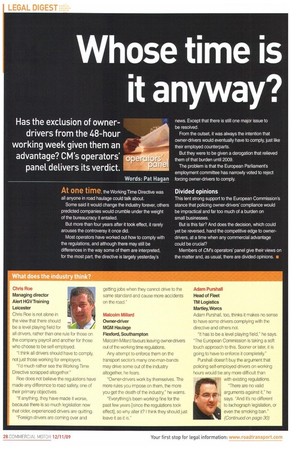Whose time is it anyway?
Page 28

If you've noticed an error in this article please click here to report it so we can fix it.
Has the exclusion of ownerdrivers from the 48-hour working week given them an advantage? CM's operators' panel delivers its verdict.
Words: Pat Hagan At one time, the Working Time Directive was all anyone in road haulage could talk about.
Some said it would change the industry forever, others predicted companies would crumble under the weight of the bureaucracy it entailed But more than four years after it took effect, it rarely arouses the controversy it once did.
Most operators have worked out how to comply with the regulations, and although there may still be differences in the way some of them are interpreted. for the most part the directive is largely yesterday's news. Except that there is still one major issue to be resolved.
From the outset, it was always the intention that owner-drivers would eventually have to comply, just like their employed counterparts.
But they were to be given a derogation that relieved them of that burden until 2009.
The problem is that the European Parliament's employment committee has narrowly voted to reject forcing owner-drivers to comply.
Divided opinions
This lent strong support to the European Commission's stance that policing owner-drivers' compliance would be impractical and far too much of a burden on small businesses.
But is this fair? And does the decision, which could yet be reversed, hand the competitive edge to ownerdrivers, at a time when any commercial advantage could be crucial?
Members of CM's operators' panel give their views on the matter and, as usual. there are divided opinions.
















































































































































